The Brain
The brain is a complex organ that serves as the command center of the nervous system in vertebrates. It controls and coordinates most functions of the body and mind, including thought, movement, emotion, and vital functions such as heartbeat and breathing.
Parts of the Brain
The brain is divided into several regions, each with specific functions:
- Cerebrum: This is the largest part of the brain and is responsible for thinking, perceiving, producing and understanding language, and controlling voluntary movements.
- Cerebellum: This part of the brain is responsible for coordination and balance, as well as muscle tone.
- Brainstem: The brainstem controls basic life functions such as breathing, heart rate, and digestion. It also serves as the communication pathway between the brain and the rest of the body.
- Thalamus and Hypothalamus: These regions regulate functions such as sleep, hunger, thirst, and body temperature.
Functions of the Brain
The brain performs a wide range of functions that are essential for daily life:
- Thinking and Problem-Solving: The brain is responsible for cognitive functions such as thinking, reasoning, and problem-solving.
- Movement and Coordination: It controls voluntary and involuntary movements, as well as coordination and balance.
- Emotions and Behavior: The brain regulates emotions and behavior, influencing how we feel and act in different situations.
- Sensory Processing: It processes and interprets information from the senses, allowing us to see, hear, touch, taste, and smell.
- Homeostasis: The brain maintains internal balance by regulating bodily functions such as temperature, blood pressure, and fluid balance.
Study Tips
To better understand the brain, consider the following study tips:
- Use diagrams and models to visualize the different parts of the brain and their functions.
- Explore interactive resources and videos that explain how the brain works.
- Engage in hands-on activities, such as puzzles and games, to learn about brain function and structure.
- Read books and articles about the brain to deepen your knowledge and understanding.
- Discuss the brain with friends or family members to exchange ideas and insights.
◂Science Worksheets and Study Guides Third Grade. Hands-on Lab Skills/Science Inquiry - 3rd grade
Study Guide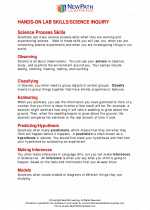 Hands-on Lab Skills/Science Inquiry - 3rd grade
Hands-on Lab Skills/Science Inquiry - 3rd grade  Worksheet/Answer key
Worksheet/Answer key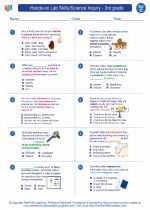 Hands-on Lab Skills/Science Inquiry - 3rd grade
Hands-on Lab Skills/Science Inquiry - 3rd grade  Worksheet/Answer key
Worksheet/Answer key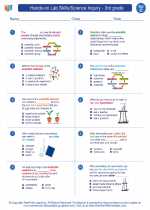 Hands-on Lab Skills/Science Inquiry - 3rd grade
Hands-on Lab Skills/Science Inquiry - 3rd grade  Worksheet/Answer key
Worksheet/Answer key Hands-on Lab Skills/Science Inquiry - 3rd grade
Hands-on Lab Skills/Science Inquiry - 3rd grade  Worksheet/Answer key
Worksheet/Answer key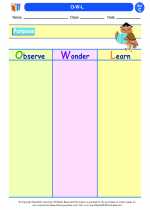 O-W-L
O-W-L  Vocabulary/Answer key
Vocabulary/Answer key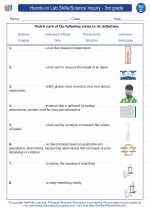 Hands-on Lab Skills/Science Inquiry - 3rd grade
Hands-on Lab Skills/Science Inquiry - 3rd grade  Vocabulary/Answer key
Vocabulary/Answer key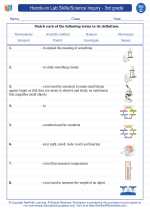 Hands-on Lab Skills/Science Inquiry - 3rd grade
Hands-on Lab Skills/Science Inquiry - 3rd grade 

 Worksheet/Answer key
Worksheet/Answer key
 Worksheet/Answer key
Worksheet/Answer key
 Worksheet/Answer key
Worksheet/Answer key
 Worksheet/Answer key
Worksheet/Answer key
 Vocabulary/Answer key
Vocabulary/Answer key
 Vocabulary/Answer key
Vocabulary/Answer key

The resources above cover the following skills:
Science as Inquiry and Process: A student should understand and be able to apply the processes and applications of scientific inquiry. A student who meets the content standard should:
Develop an understanding of the processes of science used to investigate problems, design and conduct repeatable scientific investigations, and defend scientific arguments.